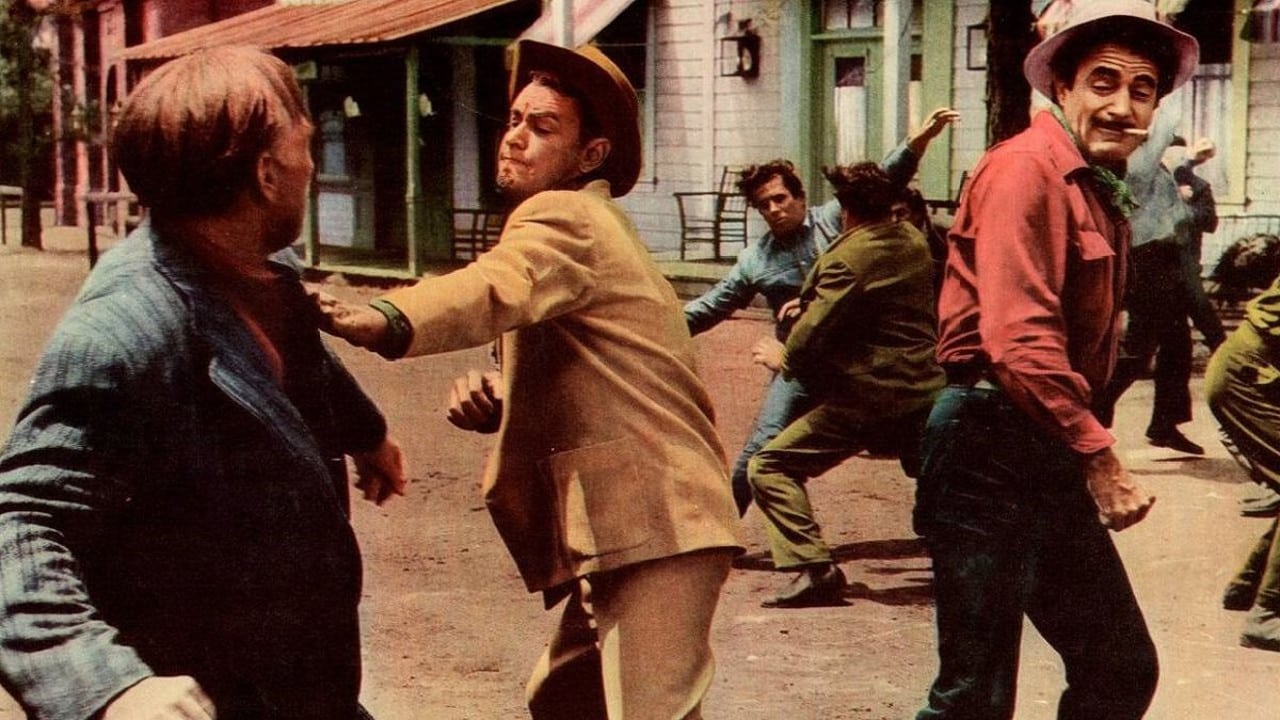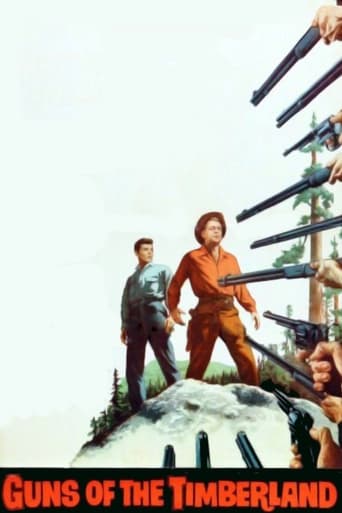Exoticalot
People are voting emotionally.
2freensel
I saw this movie before reading any reviews, and I thought it was very funny. I was very surprised to see the overwhelmingly negative reviews this film received from critics.
Hattie
I didn’t really have many expectations going into the movie (good or bad), but I actually really enjoyed it. I really liked the characters and the banter between them.
Gary
The movie's not perfect, but it sticks the landing of its message. It was engaging - thrilling at times - and I personally thought it was a great time.
Matthew_Capitano
Dud logging story about a land developer who meets the usual resistance from uncooperative locals.Alan Ladd shows up looking gayer than usual, Jeanne Crain resembles a porn actress, and Frankie Avalon-- Frankie Avalon?! What the hell is he doing in this movie? Don't tell me he's gonna sing... yep, he does. I was afraid of that. Gilbert Roland is on hand to offer some of his patented charisma, but it's all for nothing because this film sucks.Devoid of atmosphere with amateurish mistakes like opening the film with a chorus singing a song which would be more at home in a fairy tale about Snow White. This movie falls flat... TIM-BER!!!
Brian Camp
Of the five reviews contributed here for GUNS OF THE TIMBERLAND so far, four are quite negative, so today, on the date of Alan Ladd's centennial, please allow me to balance out the critical consensus. I'm a big fan of Ladd and a huge fan of westerns (I've reviewed a few dozen on IMDb) and I had a good time with this film, which I watched on TCM when it aired last week. Sure, Ladd was old and tired and near the end of his career, but he still has that movie star quality that put him at the top of the box office chart so consistently in the 1940s and early '50s. There's a sense of sincerity and conviction he brings to every role he played. We believe him. Here he plays the fair-minded boss of a logging crew at odds with neighboring ranchers in timber country. The ranchers have powerful arguments against logging and one can't help but agree with them. One of the ranchers, a pretty but tough lady named Laura Riley (well played by Jeanne Crain), even gives Ladd a tour of a ghost town that was made uninhabitable by flooding after logging on adjacent hills led to erosion and mud slides. Ladd listens to the arguments and eventually gets into a confrontation with his stubborn partner, Monty, played by Gilbert Roland, leading to an action-packed forest fire climax.The plot moves well, is reasonably suspenseful, and boasts lots of action. We see plenty of train action, trees falling, and the dynamiting of a mountain pass at one point, all enhanced by extensive location shooting. The townsfolk present a united front against the loggers, leading to a big brawl in town in one sequence where the loggers have come on a Saturday night to take over the saloon. One of the ranchers is played by Lyle Bettger, who usually played particularly vicious heavies in westerns throughout the 1950s. (He's Ike Clanton in GUNFIGHT AT THE O.K. CORRAL.) He masterminds a couple of devious maneuvers against the loggers here, but he's actually, overall, a good guy, which is quite surprising.Ladd would have turned 100 today (September 3, 2013), but died 50 years ago, in January 1964, from a lethal (and probably accidental) combination of alcohol and pills. He had a good run in Hollywood for 20 years and made far more films I like than films I didn't. He was a quintessential Hollywood movie star, studio-created but fan-supported. He may not have had much range, but was very dependable within his range and always gave the fans what they wanted.
weezeralfalfa
Caught this much under-rated film on a Jeanne Crain memorial day at TCM. Although the title suggests that guns were a prominent part of this lumberjacking drama, actually fists, dynamite, falling trees, a forest fire and angry words do most of the damage in the many confrontations between the loggers and local valley ranchers plus townies, and sometimes between loggers.The plot is rather similar to that of the previous "The Big Trees" and its predecessor "Valley of the Giants". However, instead of the point of saving the trees merely because of their extreme size and age, the point here is to prevent gross soil erosion from clear-cutting a forest on a steep mountain slope. The ranchers and townies below realize that, without the trees, their pastures and town below will likely soon be destroyed by floods and the accompanying mud and silt. In this respect , the point of the film actually is much closer to that of the '37 "Gold is Where You Find It", which dramatizes the historical flooding and sedimentation of downstream towns and cultivated fields, after extensive blasting of gold-bearing CA river bluffs with high pressure water hoses. It also differs from "The Big Trees" in that, instead of the lumber baron giving up his logging life in favor of the simple life of the tree huggers, the horsewoman rancher(Jeanne Crain, as Laura Riley). who helped lead the opposition to the loggers, seemingly implausibly runs off with the lumber baron.Jeanne Crain, in her mid-30s, is stunning looking, and quite charismatic as a dominant voice in the vehement objections of the valley people to the loggers, headed by Jim Hadley(Alan Ladd) and Monte Walker(Gilbert Roland). I'd much rather have Kirk Douglas("The Big Trees") or someone equally dynamic appearing and acting in the lead. Yes, it's rather difficult to imagine feisty Riley getting too excited in a romantic way over sleepy looking and often acting Ladd, as Jim, especially after their many hostile confrontations. Even during the height their fight over logging the trees, they incongruously steal a passionate kiss, as a hint of the possible future. I think we can rationalize her turnabout as due to a combo of 1) recognizing a very similar determined personality in Jim 2)Jim's belated changed attitude toward logging the disputed forest, 3) his concern for her badly injured adopted son from a tree fall, 4) his heroic rescue of badly injured partner Monte from the forest fire. Perhaps she was also attracted to a move-around life, after a life stuck on her ranch and little town. We see a similar transformation of Doris Day in a western setting, in "Calamity Jane", released the following year, and again in "The Ballad of Josie", with an implied message for contemporary women.The drama between the valley folk vs. the loggers, and within the loggers, is well done and maintains interest. Yes, near the end,, it gets a little crazy, with people switching sides and undecided what to do. Gilbert Roland, as Monte, wants to keep on fighting after Jim decides further fighting isn't worth it and after Riley shows him a neighboring ghost town after the forest above was clear-cut. The only gun battle is near the end, when Monty and Jim duel after Monte uses dynamite to clear the trees that the valley people felled over the logging road. After Jim wounds Monte in the right shoulder, he runs into the forest and sets fire to some pine needles, which starts a fire. Monte must have realized that he would surely die in this fire, as he was now weak from loss of blood. Clearly, he momentarily wanted to destroy this forest by fire, thus extracting vengeance on the hostile valley people. Then, Jim risks his life trying to find and carry Monte out of the fire, even knowing Monte might shoot him. After his apparently successful rescue, Monte soon died anyway, probably mostly from blood loss. Monte's death symbolizes the end of mindless government-approved short-term forest exploitation, as applied to this area. It also symbolically opens up the possibility of a new partner for Jim, in the person of Riley(We can see a similar symbolism in many other films, for example: "The Big Trees" and "The Far Country").Frankie Avalon, then a heart throb on the rock and roll scene, is included to hopefully attract more teenagers in the audience. He mainly plays Riley's adopted orphan son, who becomes the loggers only semi-friend. In fact, he says he would like to become a logger, despite his small body frame. After nearly killed by a falling tree, Jim talks him into staying on his family's ranch. He has one rock and roll scene, which looks totally out of sync with the rest of the film, which clearly is scripted to be before the advent of motor vehicles. He also has a solitary love song relating to his girlfriend Jane(Alana Ladd). His acting is a bit stiff. He would return for a part in the classic western "The Alamo", before costarring in an endless series of beach and bikini musical romantic comedies.In conclusion, this film succeeds in making its point about the dangers of clear-cutting erosion-vulnerable forests, while providing an action-packed conflict story at the local level. The various character actors are all fine. Just, producer Alan Ladd should have found someone more dynamic-looking to play Jim. Also, the title is lousy.
MartinHafer
Aside from a plot that would become more and more relevant as the decade progressed as well as a chance to see Alan Ladd's daughter, Alana, I can't see much about this dull little film that would encourage me to recommend it or see it again. Like most of Alan Ladd's later films, it's very listless and dull. Plus, I really am not sure what the message was nor do I think the folks making the film knew either.The film begins with some loggers coming to clear the land. However, the locals are very unhappy as they are concerned about the ecological effects this might have on the town below. This is understandable. However, instead of trying to work with the loggers or go through the courts to stop them, some of the locals (led by Lyle Bettger and Jeanne Craine) decide that pretty much anything is fair to stop the tree cutting. During most of the town's dirty tricks, the boss of the logging outfit (Ladd) is amazingly complacent. In fact, this is his mood through almost all the film--like he's only semi-conscious. As a result, one of his men, Monty (Gilbert Roland) has had enough and has decided to fight fire with fire, so to speak. Then, and only then, does the boss rouse out of his near slumber.I know it might sound rather nasty, but at this point in his career, Alan Ladd was a hard-core alcoholic. Because of this, he began to look puffy and his acting became much more muted and slow. I really think this is a serious problem in "Guns of the Timberland". However, it's NOT the biggest problem. This problem is the writing. The film doesn't seem to know WHAT the message is and many of the characters are, as a result, very inconsistent. Too often, folks behave in ways that defy common sense as well as who they have been throughout the film--particularly Ladd and Craine. Overall, the film is sluggish and dull and this is rather sad, as in his prime, Ladd was an exciting actor. Here, he's as dull as dish water.

